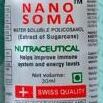Policosanol: The Natural Supplement Taking Cholesterol Management to New Heights
In an era where health-conscious consumers are increasingly turning to natural remedies, policosanol has emerged as a remarkable supplement in the realm of cholesterol management. Derived from the waxy coating of sugarcane, policosanol represents a novel avenue for those seeking to maintain healthy cholesterol levels with minimal side effects. This article explores what policosanol is, its benefits, and its potential as a sustainable solution for cholesterol regulation.
What is Policosanol?
Policosanol is a mixture of long-chain aliphatic alcohols, primarily extracted from sugarcane, though it can also come from beeswax and other plant sources. Its primary active compound, octacosanol, has garnered attention for its purported cardiovascular benefits. Originally introduced in Cuba for its cholesterol-lowering properties, policosanol has been the subject of various studies that suggest its potential efficacy in promoting heart health.
Cholesterol: A Brief Overview
Cholesterol is a type of fat found in the blood that plays a crucial role in the formation of cell membranes, certain hormones, and vitamin D. While the body needs cholesterol to function, having too much of it—especially low-density lipoprotein (LDL) cholesterol—can lead to a higher risk of cardiovascular disease, stroke, and other associated health issues. High-density lipoprotein (HDL) cholesterol, on the other hand, is considered "good" cholesterol because it helps remove LDL cholesterol from the bloodstream.
How Does Policosanol Work?
Research suggests that policosanol may reduce the production of cholesterol in the liver. It works by inhibiting key enzymes involved in cholesterol synthesis, which can lead to a decrease in LDL cholesterol levels while potentially increasing HDL levels. This dual effect is critical for maintaining a healthy cholesterol balance.
Benefits of Policosanol
-
Cholesterol-Lowering Effects: Multiple studies demonstrate that policosanol can effectively lower total cholesterol and LDL levels. Some trials have shown reductions of 10-20%, making it a viable option for those looking to manage their cholesterol without pharmacological interventions.
-
Enhancement of HDL Levels: In addition to lowering LDL cholesterol, policosanol may also help increase HDL cholesterol levels, contributing to improved cardiovascular health.
-
Antioxidant Properties: Policosanol exhibits antioxidant effects, which can help neutralize harmful free radicals in the body, thus reducing oxidative stress and its associated risks.
-
Anti-Inflammatory Effects: Preliminary research indicates that policosanol may possess anti-inflammatory properties, further supporting cardiovascular health and reducing the risk of atherosclerosis.
- Safety Profile: One of the most compelling reasons consumers are turning to policosanol is its safety profile. Unlike statins, commonly prescribed cholesterol-lowering medications, policosanol has been associated with fewer side effects, making it an appealing option for many.
How to Incorporate Policosanol into Your Routine
Policosanol is available in various forms, including capsules, tablets, and powder. The typical dosage ranges from 5 to 20 mg per day, depending on the specific health needs and recommendations from healthcare providers. As with any supplement, it’s essential to consult with a healthcare professional before beginning to ensure it’s appropriate for individual health conditions and is taken in conjunction with a balanced diet and healthy lifestyle.
Conclusion
As the search for effective, natural solutions to health problems continues, policosanol stands out as a promising candidate in cholesterol management. With its potential to lower LDL cholesterol, raise HDL levels, and its advantageous safety profile, policosanol is well-positioned to cement its place in the annals of natural health. However, it’s crucial to remember that no supplement can replace the fundamentals of a healthy lifestyle—regular exercise, a balanced diet, and ongoing consultation with healthcare professionals remain key components in the quest for optimal heart health.
